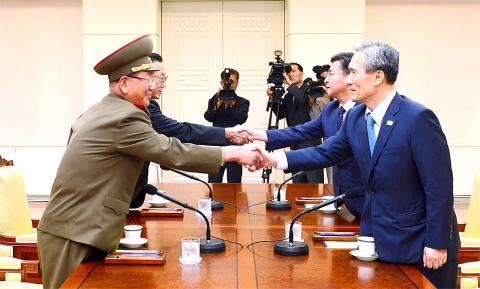Top aides to the leaders of North and South Korea met at the Panmunjom truce village straddling their border yesterday, raising hopes for an end to a standoff that put the rivals on the brink of armed conflict.
The meeting at the demilitarized zone (DMZ) village, known for its sky-blue huts and grim-faced soldiers, was set for half an hour after North Korea’s previously set ultimatum demanding that the South halt its loudspeaker propaganda broadcasts along the border or face military action.
That deadline passed without any reported incidents.

Photo: Reuters
Tension on the Korean Peninsula has been running high since an exchange of artillery fire on Thursday, prompting calls for calm from the UN, the US and North Korea’s only major ally, China. South Korea’s military remained on high alert despite the announced talks, a South Korean Ministry of Defense official said.
South Korean President Park Geun-hye’s national security adviser and her unification minister met North Korean National Defense Commission Vice Chairman Hwang Pyong-so, who is North Korean leader Kim Jong-un’s top military aide, at 6pm.
“The South and the North agreed to hold contact related to the ongoing situation in South-North relations,” Blue House deputy national security adviser Kim Kyou-hyun said in a televised briefing.
Pyongyang on Friday made an initial proposal for a meeting, and Seoul made a revised proposal yesterday seeking Hwang’s attendance, Kim said.
The North’s KCNA news agency also announced the meeting, referring to the South as the Republic of Korea, a rare formal recognition of its rival state, in sharp contrast to the bellicose rhetoric in recent days.
“They need to come up with some sort of an agreement where both sides have saved face. That would be the trick,” Seoul’s Asan Institute for Policy Studies academic James Kim said. “North Korea will probably demand that the broadcasts be cut, and they may even come to an impasse on that issue.”
North Korea, technically still at war with the South after their 1950-53 conflict ended in a truce, not a peace treaty, had declared a “quasi-state of war” in front-line areas and set the deadline for Seoul to halt the broadcasts from loudspeakers placed along the border.
“The situation on the Korean Peninsula is now inching close to the brink of a war due to the reckless provocations made by the South Korean military war hawks,” the North’s KCNA news agency said earlier.
“The fact that these powerful officials who represent South and North Korea’s leaders are meeting means this is a great time to turn the crisis into opportunity,” Seou’s University of North Korean Studies professor Yang Moo-jin said. “It is a breakthrough.”

GAINING STEAM: The scheme initially failed to gather much attention, with only 188 cards issued in its first year, but gained popularity amid the COVID-19 pandemic Applications for the Employment Gold Card have increased in the past few years, with the card having been issued to a total of 13,191 people from 101 countries since its introduction in 2018, the National Development Council (NDC) said yesterday. Those who have received the card have included celebrities, such as former NBA star Dwight Howard and Australian-South Korean cheerleader Dahye Lee, the NDC said. The four-in-one Employment Gold Card combines a work permit, resident visa, Alien Resident Certificate (ARC) and re-entry permit. It was first introduced in February 2018 through the Act Governing Recruitment and Employment of Foreign Professionals (外國專業人才延攬及雇用法),

RESILIENCE: Deepening bilateral cooperation would extend the peace sustained over the 45 years since the Taiwan Relations Act, Greene said Taiwan-US relations are built on deep economic ties and shared values, American Institute in Taiwan (AIT) Director Raymond Greene said yesterday, adding that strengthening supply chain security in critical industries, enhancing societal resilience through cooperation and deepening partnerships are key to ensuring peace and stability for Taiwan in the years ahead. Greene made the remarks at the National Security Youth Forum, organized by National Taiwan University’s National Security and Strategy Studies Institution in Taipei. In his address in Mandarin Chinese, Greene said the Taiwan-US relationship is built on deep economic ties and shared interests, and grows stronger through the enduring friendship between

CAUTION URGED: Xiaohongshu and Douyin — the Chinese version of TikTok — are tools the Chinese government uses for its ‘united front’ propaganda, the MAC said Mainland Affairs Council (MAC) Minister Chiu Chui-cheng (邱垂正) yesterday urged people who use Chinese social media platforms to be cautious of being influenced by Beijing’s “united front” propaganda and undermining Taiwan’s sovereignty. Chiu made the remarks in response to queries about Chinese academic Zhang Weiwei (張維為) saying that as young Taiwanese are fond of interacting on Chinese app Xiaohongshu (小紅書, known as RedNote in English), “after unification with China, it would be easier to govern Taiwan than Hong Kong.” Zhang is professor of international relations at Shanghai’s Fudan University and director of its China Institute. When giving a speech at China’s Wuhan

ENHANCE DETERRENCE: Taiwan has to display ‘fierce resolve’ to defend itself for China to understand that the costs of war outweigh potential gains, Koo said Taiwan’s armed forces must reach a high level of combat readiness by 2027 to effectively deter a potential Chinese invasion, Minister of National Defense Wellington Koo (顧立雄) said in an interview with the Chinese-language Liberty Times (sister newspaper of the Taipei Times) published yesterday. His comments came three days after US Secretary of State Marco Rubio told the US Senate that deterring a Chinese attack on Taiwan requires making a conflict “cost more than what it’s worth.” Rubio made the remarks in response to a question about US policy on Taiwan’s defense from Republican Senator John Cornyn, who said that Chinese